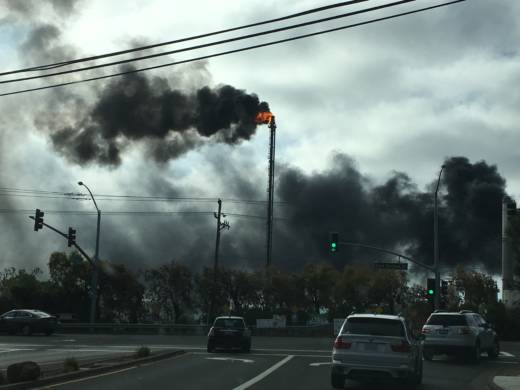Dodd said he thought his proposal was a common-sense compromise that could win legislative approval and make its way through the Legislature.
"Frankly, I was trying to thread the needle in a space that I thought was fair," Dodd said.
Currently, air regulators like the Bay Area Air Quality Management District can hand down fines of up to $10,000 a day when a refinery releases pollutants that violate air quality standards.
Environmentalists, local elected officials and the air district have complained that the penalty is barely pocket change for companies like San Ramon-based Chevron, which earned more than $9 billion in 2017.
Dodd's bill would have increased those penalties to as much as $30,000 a day. For less common but more severe violations, including those when refineries are found to be negligent or engage in "willful and intentional" acts that break regulations, penalties would have risen to as high as $250,000 a day.
The bill's death marks the second time in the last five years an effort to raise penalties for serious oil facility violations has failed in the Legislature.
In 2013, on the heels of a major fire at Chevron's Richmond refinery, then-state Sen. Loni Hancock, D-Berkeley, introduced similar legislation. It was approved by the state Senate but failed on the Assembly floor amid opposition from the energy industry.
The Western States Petroleum Association opposed Dodd's bill, too, but a spokesman for the industry group declined requests for a comment on why.
Since 2015, the association and its member companies have donated close to $26 million to political action committees and the campaigns of current state legislators, according to an analysis of campaign finance data from the California Secretary of State's Office by MapLight, an organization that studies the influence of money in politics.
But Dodd said it wasn't the oil industry's influence that led to the legislation's demise.
"I don't think the refineries being against it caused this to happen," he said. "It was the fact that there was nobody else, no significant support, on the other side."
The mayors of Benicia and Richmond, home to the Valero and Chevron refineries, said the bill was not strong enough.
Benicia Mayor Elizabeth Patterson expressed disappointment that Dodd did not amend the bill after she and Richmond Mayor Tom Butt called for it to be strengthened.
"The fines, even if tripled, aren't proportional to the cost of the event," Patterson said, adding that Dodd should have gathered more support for the bill in the Bay Area.
"It never had grass-roots support," Patterson said. "There wasn't an outreach to the affected communities."
Patterson had wanted funds from the fines to be directed to communities hurt by refinery malfunctions. Valero's power outage last May not only led to the release of a large amount of pollution, but also forced Benicia's city government to spend hours handling an emergency and led to evacuations and shelter-in-place orders, among other problems.
"We got a pretty lousy image ... with a lot of black smoke," Patterson said.
The Bay Area Air Quality Management District also wanted the fine amounts to be higher than those Dodd proposed. The agency's board of directors voted last week to push for amendments to the bill.
Environmentalists also felt the bill was weak.
Hollin Kretzmann, at the Center for Biological Diversity, said the proposal was a good step but should have been stronger. State lawmakers, though, need to act, Kretzmann said.
"California legislators need to end these political games and get serious about protecting our air and climate," Kretzmann said. "Every day they fail to act, communities near these dirty refineries pay the price with their health and safety."

